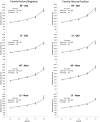A diffusion model analysis of episodic recognition in preclinical individuals with a family history for Alzheimer's disease: The adult children study
- PMID: 26192539
- PMCID: PMC4720576
- DOI: 10.1037/neu0000222
A diffusion model analysis of episodic recognition in preclinical individuals with a family history for Alzheimer's disease: The adult children study
Abstract
Objective: A family history of Alzheimer's disease (AD) increases the risk of developing AD and can influence the accumulation of well-established AD biomarkers. There is some evidence that family history can influence episodic memory performance even in cognitively normal individuals. We attempted to replicate the effect of family history on episodic memory and used a specific computational model of binary decision making (the diffusion model) to understand precisely how family history influences cognition. Finally, we assessed the sensitivity of model parameters to family history controlling for standard neuropsychological test performance.
Method: Across 2 experiments, cognitively healthy participants from the Adult Children Study completed an episodic recognition test consisting of high- and low-frequency words. The diffusion model was applied to decompose accuracy and reaction time (RT) into latent parameters which were analyzed as a function of family history.
Results: In both experiments, individuals with a family history of AD exhibited lower recognition accuracy and this occurred in the absence of an apolipoprotein E (APOE) ε4 allele. The diffusion model revealed this difference was due to changes in the quality of information accumulation (the drift rate) and not differences in response caution or other model parameters. This difference remained after controlling for several standard neuropsychological tests.
Conclusions: These results confirm that the presence of a family history of AD confers a subtle cognitive deficit in episodic memory as reflected by decreased drift rate that cannot be attributed to APOE. This measure may serve as a novel cognitive marker of preclinical AD.
PsycINFO Database Record (c) 2016 APA, all rights reserved.
Figures



References
-
- Albert MS, Moss MB, Tanzi R, Jones K. Preclinical prediction of AD using neuropsychological tests. Journal of the International Neuropsychological Society. 2001;7(05):631–639. - PubMed
-
- Armitage SG. An analysis of certain psychological tests used in evaluation of brain injury. Psychological Monographs: General and Applied. 1946;60:1–48.
-
- Aschenbrenner AJ, Balota DA, Tse CS, Fagan AM, Holtzman DM, Benzinger TLS, Morris JC. Alzheimer disease biomarkers, attentional control and semantic memory retrieval: Synergistic and mediational effects of biomarkers on a sensitive cognitive measure in non-demented older adults. Neuropsychology 2015 - PMC - PubMed
-
- Backman L, Small BJ, Fratiglioni L. Stability of the preclinical episodic memory deficit in Alzheimer's disease. Brain. 2001;124:96–102. - PubMed
-
- Balota DA, Burgess GC, Cortese MJ, Adams DR. The word-frequency mirror effect in young, old, and early-stage Alzheimer's sisease: Evidence for two processes in episodic recognition performance. Journal of Memory and Language. 2002;46(1):199–226. doi: 10.1006/jmla.2001.2803. - DOI
Publication types
MeSH terms
Substances
Grants and funding
LinkOut - more resources
Full Text Sources
Other Literature Sources
Medical
Miscellaneous

